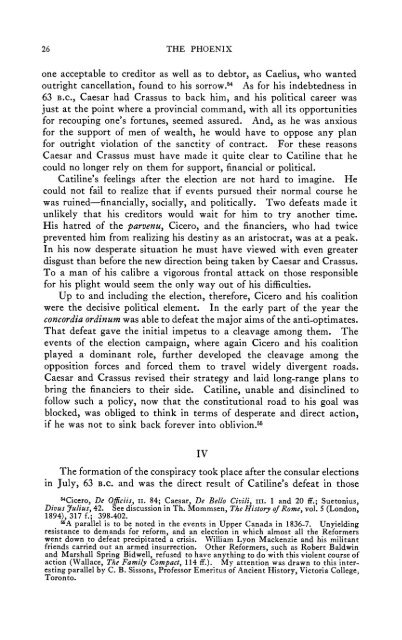Catiline and the "Concordia Ordinum" - Historia Antigua
Catiline and the "Concordia Ordinum" - Historia Antigua
Catiline and the "Concordia Ordinum" - Historia Antigua
Create successful ePaper yourself
Turn your PDF publications into a flip-book with our unique Google optimized e-Paper software.
26 THE PHOENIX<br />
one acceptable to creditor as well as to debtor, as Caelius, who wanted<br />
outright cancellation, found to his sorrow.54 As for his indebtedness in<br />
63 B.c., Caesar had Crassus to back him, <strong>and</strong> his political career was<br />
just at <strong>the</strong> point where a provincial comm<strong>and</strong>, with all its opportunities<br />
for recouping one's fortunes, seemed assured. And, as he was anxious<br />
for <strong>the</strong> support of men of wealth, he would have to oppose any plan<br />
for outright violation of <strong>the</strong> sanctity of contract. For <strong>the</strong>se reasons<br />
Caesar <strong>and</strong> Crassus must have made it quite clear to <strong>Catiline</strong> that he<br />
could no longer rely on <strong>the</strong>m for support, financial or political.<br />
<strong>Catiline</strong>'s feelings after <strong>the</strong> election are not hard to imagine. He<br />
could not fail to realize that if events pursued <strong>the</strong>ir normal course he<br />
was ruined-financially, socially, <strong>and</strong> politically. Two defeats made it<br />
unlikely that his creditors would wait for him to try ano<strong>the</strong>r time.<br />
His hatred of <strong>the</strong> parvenu, Cicero, <strong>and</strong> <strong>the</strong> financiers, who had twice<br />
prevented him from realizing his destiny as an aristocrat, was at a peak.<br />
In his now desperate situation he must have viewed with even greater<br />
disgust than before <strong>the</strong> new direction being taken by Caesar <strong>and</strong> Crassus.<br />
To a man of his calibre a vigorous frontal attack on those responsible<br />
for his plight would seem <strong>the</strong> only way out of his difficulties.<br />
Up to <strong>and</strong> including <strong>the</strong> election, <strong>the</strong>refore, Cicero <strong>and</strong> his coalition<br />
were <strong>the</strong> decisive political element. In <strong>the</strong> early part of <strong>the</strong> year <strong>the</strong><br />
concordia ordinum was able to defeat <strong>the</strong> major aims of <strong>the</strong> anti-optimates.<br />
That defeat gave <strong>the</strong> initial impetus to a cleavage among <strong>the</strong>m. The<br />
events of <strong>the</strong> election campaign, where again Cicero <strong>and</strong> his coalition<br />
played a dominant role, fur<strong>the</strong>r developed <strong>the</strong> cleavage among <strong>the</strong><br />
opposition forces <strong>and</strong> forced <strong>the</strong>m to travel widely divergent roads.<br />
Caesar <strong>and</strong> Crassus revised <strong>the</strong>ir strategy <strong>and</strong> laid long-range plans to<br />
bring <strong>the</strong> financiers to <strong>the</strong>ir side. <strong>Catiline</strong>, unable <strong>and</strong> disinclined to<br />
follow such a policy, now that <strong>the</strong> constitutional road to his goal was<br />
blocked, was obliged to think in terms of desperate <strong>and</strong> direct action,<br />
if he was not to sink back forever into oblivion.55<br />
IV<br />
The formation of <strong>the</strong> conspiracy took place after <strong>the</strong> consular elections<br />
in July, 63 B.c. <strong>and</strong> was <strong>the</strong> direct result of <strong>Catiline</strong>'s defeat in those<br />
"4Cicero, De Officiis, 11. 84; Caesar, De Bello Civili, iii. 1 <strong>and</strong> 20 ff.; Suetonius,<br />
Divus ulius, 42. See discussion in Th. Mommsen, The History of Rome, vol. 5 (London,<br />
1894), 317 f.; 398-402.<br />
66A parallel is to be noted in <strong>the</strong> events in Upper Canada in 1836-7. Unyielding<br />
resistance to dem<strong>and</strong>s for reform, <strong>and</strong> an election in which almost all <strong>the</strong> Reformers<br />
went down to defeat precipitated a crisis. William Lyon Mackenzie <strong>and</strong> his militant<br />
friends carried out an armed insurrection. O<strong>the</strong>r Reformers, such as Robert Baldwin<br />
<strong>and</strong> Marshall Spring Bidwell, refused to have anything to do with this violent course of<br />
action (Wallace, The Family Compact, 114 ff.). My attention was drawn to this interesting<br />
parallel by C. B. Sissons, Professor Emeritus of Ancient History, Victoria College,<br />
Toronto.

















